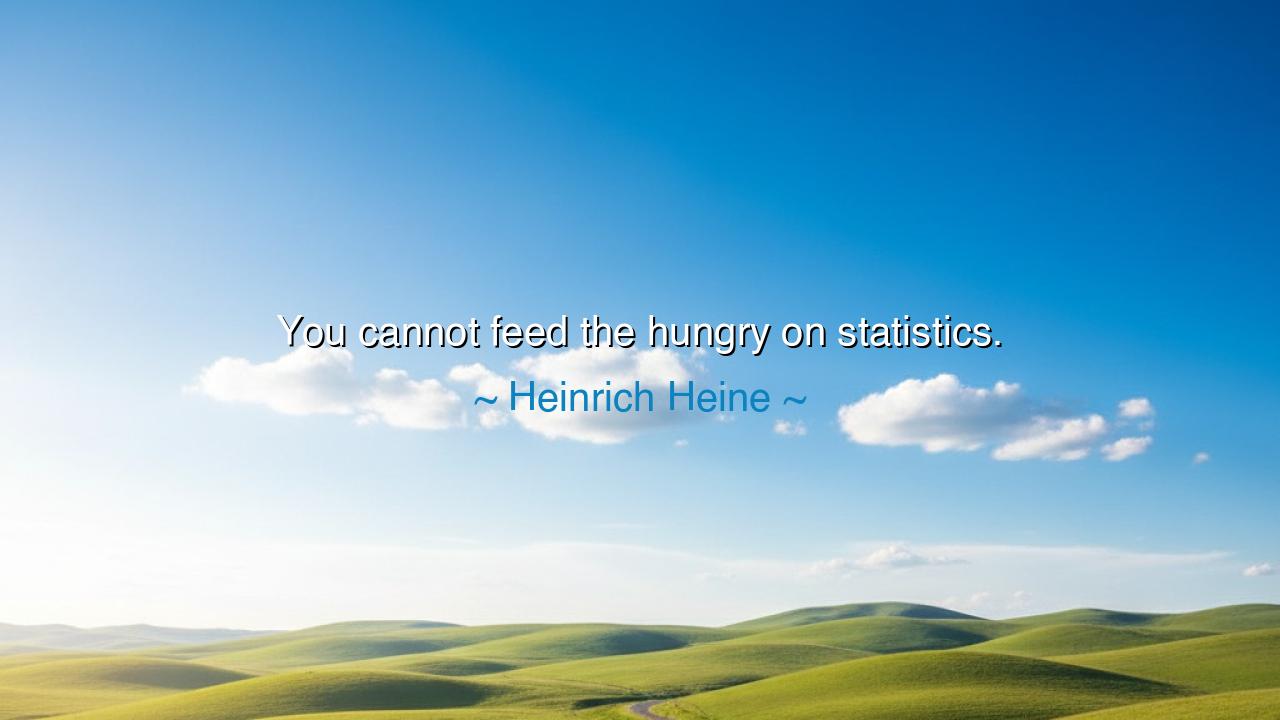
You cannot feed the hungry on statistics.






"You cannot feed the hungry on statistics." These words, spoken by the poet Heinrich Heine, carry a deep, poignant truth that transcends time and culture. Heine, in his wisdom, reminds us that abstract numbers, no matter how precise or well-intentioned, cannot resolve the real, visceral needs of people. Hunger, like suffering, cannot be soothed by the mere measurement of its extent. It requires action, compassion, and tangible solutions—elements that cannot be captured in statistics alone. His words challenge us to move beyond the comfort of abstraction and to confront the human condition with more than just cold figures; we must respond with empathy, with practical care, and with the full force of our shared humanity.
In the ancient world, the philosophers and leaders understood the limitations of intellectual abstraction. Plato, in his writings, sought to create a world governed by justice, but he also knew that justice must be lived, not just written about or theorized. In his ideal republic, it was not enough to simply know the theory of justice; it had to be enacted, with each citizen playing their part in ensuring the well-being of the community. The Stoics, too, taught that knowledge of virtue and ethics was not enough to lead a good life—action was required, especially toward those who suffer. Heine’s words echo these ancient teachings: knowledge, however profound, is insufficient unless it translates into action that directly addresses the needs of the people.
Consider the story of Dorothea Dix, a woman of the 19th century who, much like Heine, understood that the mere statistics of suffering—whether the number of people in prisons or the mentally ill—could never address the human need. Dix, who began her advocacy for the mentally ill after visiting jails and asylums in Massachusetts, found the conditions appalling. The statistics—the number of people incarcerated or institutionalized—told one story, but the human experience told another. What Dix saw were people, not numbers; she saw the suffering, the neglect, and the humiliation that could not be captured in any report. In response, Dix did not remain content with theoretical statistics; she campaigned for better care and treatment for the mentally ill. Her efforts transformed the care of the mentally ill in the United States and remind us that numbers alone cannot change the world—action and compassion do.
Heine’s quote is a challenge to our own time, as we are increasingly surrounded by a world of statistics—whether it is poverty, unemployment, inequality, or climate change. Data has become the currency of our modern age, used to explain and justify the conditions of the world. However, just as Heine warns, statistics can never feed the hungry or heal the broken-hearted. A report detailing the number of malnourished children cannot nourish a single one of them. A study on poverty will not lift a person out of their despair. Statistics, though useful for understanding the scale of an issue, must not be a substitute for real, tangible action.
The powerful example of the Marshall Plan after World War II illustrates the crucial shift from numbers to action. In the aftermath of the war, Europe lay in ruins, its people suffering and economies shattered. The statistics of destruction were overwhelming, but the real solution came not from the mere calculation of need but from a profound act of generosity—the United States’ investment in rebuilding Europe. The Marshall Plan did not simply provide economic aid based on figures; it brought real material resources and human support to nations devastated by war. This was not a theory of recovery; it was the application of action to alleviate human suffering. It reminds us that the true remedy for hunger, suffering, or injustice cannot lie solely in numbers but in the direct and compassionate response to the human needs behind them.
The lesson in Heine's words is not just a critique of statistics, but a profound call to humanity—to remember that behind every number, there is a person. Each statistic represents a real individual with hopes, dreams, and struggles, and it is through action that we can begin to address their needs. The numbers can guide us to understanding the scope of a problem, but it is the action, the compassion, and the resources we bring to bear that can truly solve it. Heine’s quote reminds us that our obligation is not to the figures on a report, but to the people those figures represent. As a society, we must act with urgency, driven not just by data, but by the deep understanding that the world’s most pressing challenges require real solutions, not mere calculations.
In your own life, consider the statistics that fill your world—whether related to the challenges you face, the community you belong to, or the global issues that weigh heavily on your heart. Ask yourself: How can you move beyond the numbers and into action? Whether it is in addressing the needs of the hungry, the disenfranchised, or the marginalized, it is not enough to know the numbers; you must act with compassion. Heine’s wisdom calls us to a higher standard, urging us to recognize the true humanity behind the data, and to meet that humanity with the same care and effort that we would want for ourselves. Let the words of Heine inspire you to turn statistics into tangible action that nourishes, heals, and brings real change to those who need it most.






AAdministratorAdministrator
Welcome, honored guests. Please leave a comment, we will respond soon